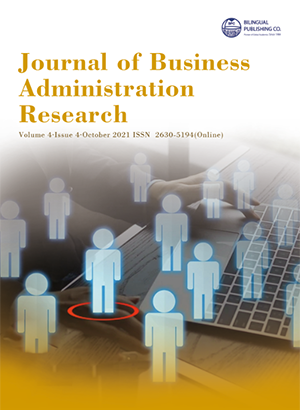The Vocational Integration of Students-Apprentices in the Context of a Pandemic Crisis: Feedback from the University CFA in Corsica
DOI:
https://doi.org/10.30564/jbar.v4i4.3655Abstract
The COVID-19 pandemic has generated major economic impacts in the vast majority of countries, including falling GDP and global trade, massive job losses, deficits and increased public debt. If quasi-generalized interventionist economic policies have made it possible to cushion the paralysis of the productive devices, the short-term global outlook remains very uncertain. In this gloomy context, what will be the situation on the labour market, and in particular the vocational integration of students? Corsica presents the example of a small island territory in search of a regional development scheme based on the economy of knowledge and competence. In this major structural perspective, the University Apprenticeship Training Centre (CFA UNIV) in the Corsican region has been striving, for a decade, to contribute to the enhancement of students-apprentices vocational integration from the University of Corsica. Within the scope of its activities, are the monitoring and evaluation of the students-apprentices’ professional integration from the University of Corsica. Since 2011, the carrying out the annual surveys on students-apprentices’ future from the University of Corsica has demonstrated the capacity of the sandwich course training in Higher Education simultaneously to boost the employability of skilled human capital and the growth of local business structuring. This contribution will aim to synthesize ten years of CFA UNIV experience and will endeavour to analyse the localized consequences of a global pandemic crisis on the nature of the vocational integration student-apprentices from the University of Corsica in a small territory island.
Keywords:
Higher education; Apprenticeship; Vocational integration; Students; ApprenticesReferences
[1] GERMINET F., 2015, Le développement de la formation continue dans les universités, Rapport de mission, novembre.
[2] FILÂTRE D., 2016, Vers un nouveau modèle de Formation Tout au Long de la Vie, Rapport la Formation Continue, MENESR, novembre.
[3] STORAÏ C. et RINIERI L., 2016 a, « Regional human capital development policy and Sandwich placement training in Higher Education: lessons learned from the pioneering example of the University of Corsica in a small island economy », Chinese Business Review, ISSN 1537- 1514 May, Vol. 15, No. 5, 243-257.
[4] STORAÏ C. et RINIERI L., 2019 « Choose one’s professional future and sandwich training in Higher Education: experiences and perspectives from CFA University in Corsica », Journal of Business Administration Research, Volume 02, Issue 03, July pp. 10- 17.
[5] STORAÏ C . et RINIERI L., 2018, « The System of Sandwich Courses in Higher Education at the Heart of Structuring a Small Island Territory: Lessons Learned from the Pioneering Example of The CFA University in the Corsican Region », IBIMA Business Review, Vol. 2018 (2018), Article ID 482281, 19 pages. DOI: 10.5171/2018.482281.
[6] STORAÏ C., RINIERI L. et BOULENGER M., 2014, « Sandwich-Course Training in Higher Education as a major Strategic Thrust Regional Policy of Professional Training : Lessons Learned From the Pioneering Example of the University Institute of Technology Corsica », Chinese Business Review, Volume 13, Number 2, February (Serial Number 128) pp.101-110.
[7] STORAÏ C.et RINIERI L., 2016 b, « SandwichCourse in Higher Education and Entrepreneurship Awareness: Case of the Graduates from University Apprenticeship Training Centre, Corsica », Global Journal of Human-Social Science, vol XVI, Issue IX, pp.1-5.
[8] MARCHESNAY M., KAMMOUN S.C. et KARRAY H.E., 2006, «Y-a-t-il un entrepreneuriat méditerranéen?» Revue Française de Gestion, Vol. 32. n° 166.
[9] DRUCKER P., 2016, « Qu’est –ce qu’un véritable manager ? », Harvard Business Review, Hors serie, automne.
[10] STORAÏ C. et RINIERI L., 2019 « Choose one’s professional future and sandwich training in Higher Education: experiences and perspectives from CFA University in Corsica », Journal of Business Administration Research, Volume 02, Issue 03, July pp. 10- 17.
[11] LAMETA N. et STORAÏ C., 2016, « Integrating a Work-Study Programme in an Entrepreneurship Course to Develop Leadership », International Journal of Managerial Studies and Research, Vol4, Issue12, december, pp. 1-5.
[12] MINISTERE DU TRAVAIL, 2018, Les opérateurs de compétences : transformer la formation professionnelle pour répondre aux enjeux de compétences, Rapport de mission, 24 août.
[13] OCDE, 2020, Perspectives économiques de l’OCDE, décembre.
[14] COLLETIS G. et PECQUEUR B., 1996, « Firmes et territoires : entre nomadisme et ancrage. », Revue Espaces et Sociétés n° spécial.
[15] VELTZ P., 1996, Mondialisation, villes et territoires. L’économie d’archipel, Paris PUF.
Downloads
Issue
Article Type
License
Copyright and Licensing
The authors shall retain the copyright of their work but allow the Publisher to publish, copy, distribute, and convey the work.
Journal of Business Administration Research publishes accepted manuscripts under Creative Commons Attribution-NonCommercial 4.0 International License (CC BY-NC 4.0). Authors who submit their papers for publication by Journal of Business Administration Research agree to have the CC BY-NC 4.0 license applied to their work, and that anyone is allowed to reuse the article or part of it free of charge for non-commercial use. As long as you follow the license terms and original source is properly cited, anyone may copy, redistribute the material in any medium or format, remix, transform, and build upon the material.
License Policy for Reuse of Third-Party Materials
If a manuscript submitted to the journal contains the materials which are held in copyright by a third-party, authors are responsible for obtaining permissions from the copyright holder to reuse or republish any previously published figures, illustrations, charts, tables, photographs, and text excerpts, etc. When submitting a manuscript, official written proof of permission must be provided and clearly stated in the cover letter.
The editorial office of the journal has the right to reject/retract articles that reuse third-party materials without permission.
Journal Policies on Data Sharing
We encourage authors to share articles published in our journal to other data platforms, but only if it is noted that it has been published in this journal.




 Christophe Storaï
Christophe Storaï

